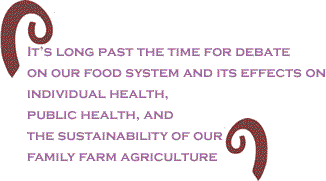
|
||||||||||||||||||||||
|
||
 |
||
 |
||
Transnational
corporations are consolidating their stranglehold over food and
food production, not just in the Our own country is a very important market for them, since it is the most lucrative market, but there is trouble brewing in the food system and it involves strange diseases and maladies among young and old that the medical establishment can�t seem to understand, let alone resolve. This
week, the press reported that a recent analysis of Although the research is not conclusive, researchers say that the study points in the direction of chemical residues - pesticides, herbicides, fungicides, and other chemicals that delay or speed up ripening or preserve the food - that children consume when they eat the food. Only
researchers in public health (or individual health for that matter)
are required to prove so conclusively that something is dangerous.
The chemical and other industries that are involved in filling the
shelves of
Where
do they all go? For the most part, they go directly into the bodies
of individuals, they go onto crop fields, into the air, and they
go into the groundwater. From the groundwater, they go into the
lakes, streams, and rivers, and then into the oceans. Casual observers
know that the oceans have been in serious trouble, even before the
monumental spill by British Petroleum in the Another problem that should continue to be a topic of heated discussion in coming months and years is the use of genetically manipulated - commonly known as �genetically modified� or GMOs - plants used for food. GMOs were developed as a way to corner the seed market, which, to a great extent, has been accomplished by Monsanto, a St. Louis-based chemical and seed transnational corporation. GMO plants (and, even, animals) can be patented and profits can be made from them. Of course, Monsanto has not managed to control of all seeds in the world, but they have made great progress toward that end. As
much as 70-80 percent of
Monsanto, which holds patents on such crops, makes huge profits from the patents. Their position as part of Corporate America helps to consolidate their power over farmers and growers, as the national seed pool is inexorably shrunk to include mostly their seeds and their chemicals, which are needed to grow them. A study that is not scheduled to be released until July was recently reported by Jeffrey Smith, author of Seeds of Deception, in Huffington Post last month, who noted that experiments on hamsters have shown severe damage from ingestion of GMO foods. The experiment, by two Russian scientific organizations, Smith wrote, showed that �after feeding hamsters for two years over three generations, those on the GM diet, and especially the group on the maximum GM soy diet, showed devastating results. By the third generation, most GM soy-fed hamsters lost the ability to have babies. They also suffered slower growth, and a high mortality rate among the pups.� He pointed out that the problems did not show up in the first, or even the second generation, but that the third generation was the one that paid the price. The full study is likely to paint a broader picture. While it�s true that hamsters are not people, the effects of this study should give pause to those who wish to plunge headlong into the full use of every genetically manipulated plant that can be developed for general use as food for humans.
Those foods contain much of the genetically manipulated crops and they are the ones that are hugely subsidized by the government, so they can be sold more cheaply as fast foods and other prepared foods. Again, the long-term effects are unknown. In
the last two weeks, there was a story in a weekly farm paper that
described a �donation� of corn seed to 4,500 Haitian farmers. When
asked, who the donor was, the public relations woman said the donor
wished to remain anonymous, which immediately raises a flag of suspicion.
What kind of seed was donated? Were they genetically manipulated?
Tragedies like the January earthquake could enhance At the same time, Marguerite Laurent (aka Ezili Danto), founder and president of the Haitian Lawyers Leadership Network (HLLN), has questioned a donation of 475 tons of seed corn offered to Haitian farmers by Monsanto. The company has reportedly told concerned Haitians that the seed is not GMO, but many remain skeptical. Transnational corporations are working to capture the seed market in every country possible, even though the long-term effects on humans (and other creatures) who eat the GMO foods are not known and may not be able to be determined for two more generations. Although so many questions remain about the use of GMO seeds for every crop possible, their use is being encouraged and promoted by the U.S., presumably as a way of extending and enhancing Corporate America�s economic hegemony over scores of other countries. President Barack Obama has named proponents of GMO technology to his administration and they occupy important policy positions in his government. U.S. Secretary of Agriculture Tom Vilsack was a strong proponent of GMOs well before Obama nominated him. Islam
Siddiqui is now the chief agricultural negotiator for the And, CropLife, the powerful trade organization for producers and distributors of �crop protection products,� otherwise known as pesticides, was notable - before Siddiqui�s nomination - for its criticism of Michelle Obama�s creation of an organic garden on the White House grounds. It�s obvious why CropLife was critical.
OCA stated at the time: �Michael Taylor should not be a senior FDA food safety adviser. The vice president for public policy at Monsanto Corp. from 1998 until 2001, Taylor exemplifies the revolving door between the food industry and the government agencies that regulate it.� It�s long past the time when Americans should have had a full discussion and debate on our food system and its effects on individual health, public health, and the sustainability of our family farm agriculture. Until that happens - and until people are educated thoroughly about food production - Americans will continue to be the victims of a system that for decades has put profits above individual and public health.
BlackCommentator.com
Columnist, John Funiciello, is a labor organizer and former union
organizer. His union work started when he became a local president
of The Newspaper Guild in the early 1970s. He was a reporter for
14 years for newspapers in |
||
 |
||
If you would like to comment on this article, please do so below. There is a 400 character limit. You do not need a FaceBook account. Your comment will be posted here on BC instantly. Thanks. Entering your email address is not mandatory. You may also choose to enter only your first name and your location.
|
||
Thank you very much for your readership. |
||
| Any BlackCommentator.com article may be re-printed so long as it is re-printed in its entirety and full credit given to the author and www.BlackCommentator.com. If the re-print is on the Internet we additionally request a link back to the original piece on our Website. | ||
| |
||
May 20, 2010 |
| Executive Editor: David A. Love, JD |
| Managing Editor: Nancy Littlefield |
| Publisher: Peter Gamble |
| Est. April 5, 2002 |
| Printer Friendly Version in resizeable plain text format |
 |
 |
 |

|
 |
| |
| |




































 Why
is this a special problem for those who live in cities? It is especially
a problem for the poor and working class Americans who live in cities,
because they usually don�t have the means or knowledge to seek out
non-GMO foods. They have few choices in supermarkets, when one is
available, so they eat more prepared and fast foods.
Why
is this a special problem for those who live in cities? It is especially
a problem for the poor and working class Americans who live in cities,
because they usually don�t have the means or knowledge to seek out
non-GMO foods. They have few choices in supermarkets, when one is
available, so they eat more prepared and fast foods.
 The
Organic Consumers Association generated strong opposition to the
naming by Obama of former Monsanto lobbyist Michael Taylor as a
Food and Drug Administration senior advisor on �food safety.�
The
Organic Consumers Association generated strong opposition to the
naming by Obama of former Monsanto lobbyist Michael Taylor as a
Food and Drug Administration senior advisor on �food safety.�









